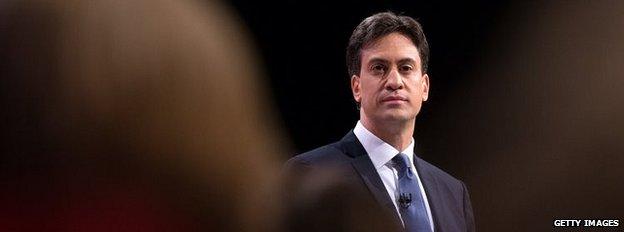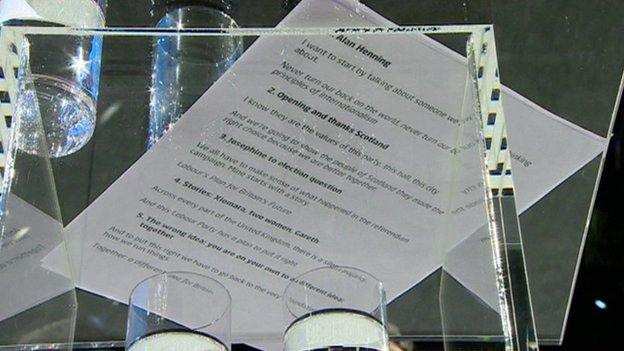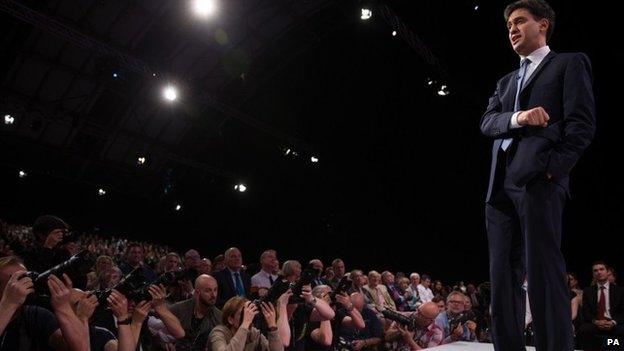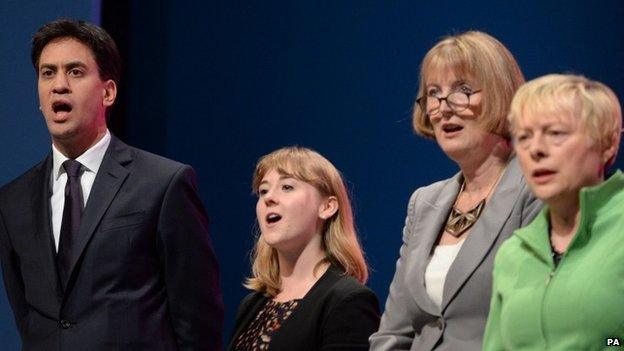Miliband says deficit is priority despite speech leaving it out
- Published
- comments
Ed Miliband: "If I did the speech again today I'd do it differently"
Ed Miliband has admitted missing out a passage on the UK's financial deficit in his Labour Party conference speech.
In a round of media interviews he said "one of the perils" of delivering a speech without a script was "not remembering every detail".
But he insisted that he had set out how Labour would tackle the economy and immigration, despite forgetting bits on both that were in the full script.
Chancellor George Osborne said omitting the deficit was "extraordinary".
Mr Osborne tweeted, external after the speech: "Ed Miliband didn't mention the deficit once. Extraordinary. If you can't fix the economy you can't fund the NHS."
A prepared text of the speech later emerged which included passages on a promise to "deal with our nation's debts" and another on immigration which Mr Miliband did not include in his conference address in Manchester.
Nick Robinson asked Ed Miliband about Iraq, spending deficit and his conference speech
Mr Miliband had intended to say Labour would take a "tough new approach" on borrowing, pointing out that the annual level of interest on government debt it would inherit was larger than the entire schools budget.

What Ed Miliband missed out

On the deficit: In the four years since we lost the last election, we have learnt hard, important lessons.
They start with government having to live within its means. If people feel cynical now - and they do - think how much worse it would be if we made false promises.
Friends, there won't be money to spend after the next election. Britain will be spending £75bn on the interest on our debt alone. That's more than the entire budget for our schools.
So as Ed Balls announced yesterday, Labour's plan is based on a tough new approach.
Eliminating the deficit as soon as possible in the next Parliament. Getting the national debt falling. And no proposals for additional borrowing. We will get the deficit down. The next Labour government will deal with our nation's debts.
On immigration: Immigration benefits our country but those who come here have a responsibility to learn English and earn their way.
And employers have a responsibility not to exploit migrant workers and undercut wages.
Because together we can and on our own we can't.
Speech, as delivered, published on the Labour website, external

He also planned to say Labour "would not have money to spend" after the election and a future government would have to "live within its means".
In the section on immigration, he was due to say "immigration benefits our country but those who come here have a responsibility to learn English and earn their way".
But in his 65-minute address, the Labour leader - who said he faced a job interview with the public between now and the election - made no mention of the public finances at all.
He made only a passing reference to immigration, when he accused David Cameron of pandering to the UK Independence Party.

Ed Miliband spoke largely from memory, taking just brief notes with him on to the stage

The speech lasted 65 minutes
The Labour leader told the BBC he "did not deliberately" drop the passages on the deficit and immigration but his approach was to write a text in advance and use it as the basis for his speech - which meant things were added in and left out on the day.
"I could just stand there and read out a pre-prepared speech," he said.
"I have chosen for the last three years to do it in a different way because I think people want to hear directly from me. That is the style I have chosen - the style that I believe works for me.
"There are perils that come with that obviously but what people got a sense of yesterday was a plan to change our country."
He said the deficit was an "incredibly high" priority, admitting that if he gave the same speech today he "would do it differently".
Pressed on whether a future prime minister should be expected to remember such an important issue, he replied: "Yes, and I did."

Labour and the deficit

Labour has said the coalition has missed its borrowing targets and it will seek to eliminate the annual budget deficit - the difference between revenue generated and spending each year - by 2020.
Borrowing has fallen in the past four years from £136.8bn in 2010-11, the first year of the coalition government, to £107.7bn in 2013-14.
The Office for Budget Responsibility has forecast borrowing will continue to fall from £95.5bn this year to £75.2bn in 2015-16, £44.5bn in 2016-17, £16.5bn in 2017-18, before recording a small surplus in 2018-19.

Mr Miliband insisted he had made clear that there would be no new borrowing to fund a £2.5bn cash injection into the NHS and that shadow chancellor Ed Balls had set out a "clear plan" to balance the books by the end of the next Parliament.
"Nobody should doubt our seriousness about tackling the deficit," he added.
"We have already shown signs on the action we will take. It is tough and it is difficult but we have laid out some of those plans."
Mr Miliband's colleagues defended their leader's slip but the absence of any mention of the deficit prompted criticism from business groups and was seized upon by Labour's opponents as evidence Mr Miliband is not ready for power.
'Touching distance'
The Lib Dems said the "rambling" speech was full of "underfunded promises" using "money that's been spent many times over".
And Len McCluskey, the general secretary of Unite - Labour's largest financial donor - said it had been a "glaring omission".

The traditional singing of the Red Flag brought Labour's conference to an end
Labour's four-day conference ended on Wednesday with speeches by health spokesman Andy Burnham, shadow home secretary Yvette Cooper and deputy leader Harriet Harman.
Mr Burnham fleshed out plans - first announced in Mr Miliband's speech - for 20,000 more nurses, 8,000 more GPs, 5,000 more care workers and 3,000 more midwives by 2020.
He said the general election campaign would be a "battle for the soul" of the NHS.
Ms Cooper was praised by the Institute of Directors after she said Labour would not adopt a target for annual net migration and called for international students to be excluded from the Conservatives' current calculations, aimed at getting figures below 100,000 a year.
And Ms Harman suggested Labour was "within touching distance" of Downing Street.
"We have got the policies, the people and the principles, but above all we have the duty to save this country from another term of Tory rule and give people the hope of a better Britain," she said.